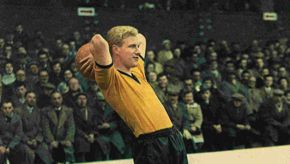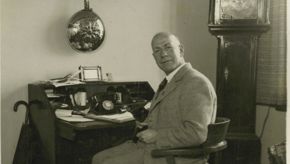He was a justly proud man when he was inducted into the Wolves Hall of Fame last year"
Malcolm Finlayson was the most decorated Wolves goalkeeper and probably the most fearless.
That was never better illustrated than in the closing minutes of the 1960 FA Cup semi-final against Villa at The Hawthorns.
With Wolves leading 1–0, marauding forward Bobby Thomson burst through and an equaliser looked on the cards until Finlayson dived at his feet.
Malcolm got injured in the process but got up and carried on after treatment and that encapsulated one of the big Scot’s greatest qualities – his bravery.
The man from Alexandria, who has died suddenly aged 84, came to Molineux near the end of August, 1956, knowing he had been bought to take over from Bert Williams, one of the finest goalkeepers in world football.
Malcolm would readily recall the day he signed as in the evening he saw one of the most fantastic games in Wolves history, a 5–4 win over Luton at Molineux.
He would always tell you that Williams and Luton’s Bernard Streten, both internationals, were “two cats” and would add “They made save after save yet it was 5–3 at half-time. I wondered what I had let myself in for.”
As it turned out, what he had let himself in for was the greatest years in the history of Wolverhampton Wanderers.
Malcolm got his first taste of life in the top flight when he made his debut as Williams’s deputy against Leeds on September 15, 1956,
He had little to do but the great John Charles, equally brilliant as striker or stopper, scored twice for the visitors and then dropped back in defence to help preserve a 2–1 lead.
In time, Malcolm would proved a more than adequate successor to Williams and was a key figure as Wolves won the title in 1958 and again in 1959 followed by the 3–0 FA Cup final triumph over Blackburn at Wembley.
It is accepted now that a goalkeeper is the cornerstone of any great side and Malcolm was a veritable Peter Schmeichel in the green jersey.
Like the Manchester United legend, Malcolm was tall and commanding – the sort of keeper to inspire confidence throughout his team.
Without doubt, he was as big a factor in Wolves’ success of the late 1950s as the powerful half-backs and the forwards who hammered in a century of goals in four successive seasons.
Malcolm, who played 203 games for Wolves, figured in the famous 3–2 floodlit win over European champions Real Madrid in 1957 and in the 2–2 draw when the sides met in Spain yet he modestly tended to ignore such momentous occasions when he looked back on his impressive career which started with over 250 games for Millwall.
He would often prefer to talk about a bizarre Millwall game against Walsall at Fellows Park in 1948 when the then teenage keeper sustained a head injury diving at the feet of a Saddlers forward.
A Millwall director took him to hospital for treatment but when they arrived back at the ground they found that the gates were locked and no amount of knocking and shouting would get them unlocked.
The director had to climb over and get them opened to let Malcolm back in. Even then the farcical happenings were not over.
“I did not realise they were now in the second half and I ran to the wrong end to resume in goal,” Malcolm would recall.
When he had left the ground Millwall led but they were 3–1 down by the time he returned. There would be seven more goals before the final whistle as the Londoners ran out 6–5 winners.
Malcolm had joined Millwall from Renfrew Juniors when 17 and stayed eight years at the Den.
When in 1956 he was called into the manager’s office to be told a First Division club wanted to sign him he assumed it was Charlton who had already approached him unofficially.
He was more than pleased when he was told that Wolves were the side who wanted him.
“I would have walked from London to play for Wolverhampton Wanderers,” Malcolm would say.
Wolves’ long-serving scout George Noakes had done a fine job in earmarking Malcolm to be the new last line of Wolves’ defence once Bert Williams retired.
Not as acrobatic as his predecessor, Malcolm had his own way of doing things and he eventually won the admiration of the fans.
Respected and self-effacing, Malcolm was an obvious choice to be chairman and then president of Wolves’ Former Players Association.
He had helped found the organisation in 1988 and always maintained close ties with his old colleagues and those of subsequent generations.
He was a justly proud man when he was inducted into the Wolves Hall of Fame last year.
Only thing missing from Malcolm’s CV was a cap from his country. It was a travesty that he was never chosen to play for the land of his birth.
Without a doubt he would have done Scotland proud – just as he did Wolves.












